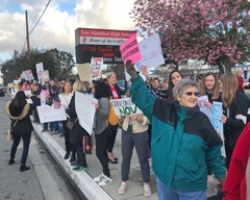
Local teens made history this past Thursday when Los Alamitos High School students organized a Save Our Students Rally against gun violence. In hopes of creating change, 300 students, teachers, parents, and community members gathered in front of the school to stage a protest urging action from authorities. According to 18-year-old senior Robby Leonard, the students were following in the footsteps of Parkland’s Douglas High School. Their desire was simple as echoed by 18-year-old student. “We want the future to be bright,” he said.
Supporting the students were Social Science teachers Mark Celtsen and Jessica Riegert. The two wholeheartedly believe in their students and want to bring awareness and safety to the community beginning by giving their students a voice. “As a 35-year veteran teacher, I have firsthand experience with the amazing capabilities of our high school students,” says Celtsen. “Who better to lead a movement?”
Riegert agreed, expressing hope that educators at Los Alamitos High School will continue to stand by their students. Even it if makes them “vulnerable” for teachers to take a stand, and even if many see the protest as “political,” the teachers think the effort is well worth. They say the protest ensures the safety of students, teachers, and community.
Riegert adds that bringing awareness and demanding action is a key because “inaction is contributing to this danger.”
As a student, Leonard believes the movement is necessary because society is becoming immune to these “heinous acts” and is direct evidence for change. He also notes that people are scared to “speak out about their own opinions and views,” causing intimidation and the “death of democracy.”
Leonard says that the solution is speaking up saying and amplifying the views of society. “One voice is then turned to two, then two to four, and so on until the single voice is indistinguishable from the harmonious cries of a nation all saying the same thing: ‘We want change,’” he said.
For Leonard, being a part of the next generation who will speak out for themselves rather than having others do it for them is vital, thus the protest. His conviction is very much connected to the affect gun violence has personally touched his life sharing, “They [lawmakers] don’t understand how it feels to have the possibility of death looming over you every single day when you go to school.”
Yet, he’s also concerned about his future and says he plans to one day become a teacher and a parent. His dreams include being able to walk in a school every day without fear alongside students, teachers, and faculty members while also having the assurance that his children will be safe, something he says his parents “cannot do today.”
Educators are also feeling the effects of the most recent shooting. Teacher and parent, Celtsen says, “I love the kids that I teach and interact within our community. I have my own children. I want to do all I can to prevent that [Parkland tragedy] from occurring here or anywhere else.”
According to Riegert, “we do this job because we want to help students reach their potential, so when a person comes in and tries to harm them, we instinctively want to protect our students. Sacrificing our lives, however, is not what our job is, and what it shouldn’t be.”
Although Celtsen owns a gun and is in favor of the Second Amendment, he says he would gladly “give up” some changes to it if Americans cannot create sensible gun regulations. According to Celtsen, “my right to own a gun is not worth more than students, teachers, and citizens, in general, dying from assault rifles.”
Both teachers have given their students the opportunity to express themselves and work through their fears and confusion through open discussion. Riegert hopes the rally will propel “meaningful dialog on the campus and in the community” to empower students to move forward with the support of educators.
Students and educators expressed a variety of goals for the movement, including banning assault weapons for non-military use, implementing a 10-day waiting period, universal background checks for everyone purchasing a firearm, preventing gun sales to those with serious mental issues, and implementing mental evaluations, gun safety classes, and testing for all firearm purchases.
Leonard sums up his sentiments with a call to action. For those on the fence or in opposition, he asks to “see things from our point of view and listen instead of dismissing us [students].” For those in support who are afraid to show it, he shares, “I urge you to speak up; you are never alone.”








